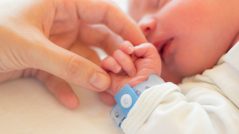Oral thrush in babies and young children is a fungal infection in the mouth that’s usually harmless and is easy to treat.
Babies are at an increased risk of oral thrush because their immune systems haven’t fully developed yet, and so they are less able to fight off infections. This is particularly the case with babies born prematurely (before 37 weeks of pregnancy).
Oral thrush can also affect babies if they have recently been treated with antibiotics. Antibiotics reduce the levels of healthy bacteria in your baby’s mouth, which can allow fungus levels to increase.
Symptoms of oral thrush
The main sign of oral thrush is a white coating on your baby’s tongue, though there may also be white patches elsewhere in their mouth. Babies might not seem to be affected by the patches, but they may be reluctant to feed from either the breast or bottle.
This white coating may look a bit like cottage cheese and usually can’t be rubbed off easily. If your baby has a white coating on their tongue that does rub off easily, it’s more likely to be milk coating the tongue and not thrush.
Your baby may also be experiencing associated nappy rash caused by the same infection, which also needs to be treated.
Treatment options
Oral thrush in babies isn’t usually serious, but you should get advice from a pharmacist if you think your child may have the condition. You can also ask your health visiting team for advice or call NHS 111. Treatment is usually with an oral suspension (medicine) or mouth gel, and usually lasts at least 7 days. Always follow the instructions on the medicine packaging. The age of your baby will determine what medication is prescribed. If your baby has nappy rash you may also be prescribed a cream to treat this.
If there’s any doubt about the diagnosis, contact your GP. They may take a swab from your baby’s mouth and send it to a lab to be tested.
Prevention techniques
It is not clear whether it’s possible to completely prevent oral thrush in babies, but the following advice may help:
- Sterilise dummies regularly, as well as any toys that your baby puts in their mouth
- Sterilise bottles and other feeding equipment after each use, especially the teats
- Wash your hands thoroughly after changing your baby’s nappy because the infection can be passed through their digestive system.


